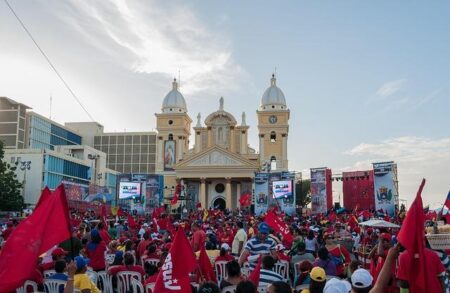WhatsApp’s Influence on Latino Political Dialogue in the U.S.: Navigating Information and Misinformation
WhatsApp as a Vital Communication Channel in Latino Communities
Within Latino populations across the United States, WhatsApp has become an indispensable platform for exchanging information and fostering political conversations. Its end-to-end encryption and broad accessibility make it a favored medium for sharing news, coordinating community efforts, and discussing political matters. However, the private and closed nature of WhatsApp groups presents unique challenges. Unlike open social media sites, the encrypted chats are largely inaccessible to fact-checkers and researchers, which can inadvertently facilitate the spread of both grassroots insights and unchecked rumors.
Core functions of WhatsApp in Latino political engagement include:
- Strengthening Community Bonds: Facilitates instant communication among family, friends, and extended networks across different regions and countries.
- Driving Political Action: Acts as a platform for mobilizing voter registration campaigns, organizing rallies, and discussing political issues relevant to Latino experiences.
- Information Amplification: Due to forwarding limits and private group dynamics, certain messages can quickly gain traction, amplifying specific perspectives.
| WhatsApp Feature | Effect on Latino Political Conversations |
|---|---|
| End-to-End Encryption | Builds confidence for sharing sensitive political views |
| Group Messaging | Encourages lively discussions but can accelerate rumor spread |
| Voice Messages and Multimedia Sharing | Strengthens emotional resonance and persuasive power of messages |
The Proliferation of Misinformation and Its Effects on Latino Voter Engagement
WhatsApp’s role as a primary source of political information for many Latino voters also makes it a hotspot for misinformation. The platform’s encrypted, private groups and forwarding features allow false or misleading content to circulate rapidly, often evading public fact-checking mechanisms. This unchecked spread of misinformation can distort perceptions of candidates, policies, and electoral processes, influencing voter decisions in significant ways.
The impact of misinformation is complex: some Latino voters may become disengaged due to confusion or distrust, while others might be mobilized by inaccurate information. Several factors intensify this challenge:
- Scarcity of reliable, culturally relevant information in Spanish and indigenous languages
- Strong reliance on trusted community networks over mainstream media outlets
- Dependence on peer-to-peer messaging as a primary news source
Addressing misinformation requires culturally sensitive, community-based strategies that enhance digital literacy and empower Latino users to critically assess the information they receive. Without such efforts, misinformation risks undermining democratic participation and perpetuating cycles of falsehoods within these communities.
Obstacles to Content Moderation on Encrypted Messaging Platforms
Moderating content on encrypted platforms like WhatsApp is inherently challenging. End-to-end encryption ensures that only the sender and recipient can read messages, preventing external parties from monitoring or filtering content. This privacy feature, while essential for user security, complicates efforts to identify and curb misinformation or harmful content, especially during sensitive periods such as elections.
Additional hurdles include:
- Privacy Protections: Attempts to scan or moderate messages risk violating user confidentiality.
- Volume and Velocity: The sheer number of daily messages makes manual review impractical and automated solutions difficult to implement without intrusiveness.
- Linguistic and Cultural Complexity: Regional dialects and culturally specific expressions within Latino communities challenge accurate content analysis.
- Decentralized Message Distribution: Rapid sharing through private groups and chains evades centralized detection systems.
| Moderation Challenge | Effect on Content Oversight |
|---|---|
| End-to-End Encryption | Blocks third-party access to message content |
| High Message Volume | Prevents effective manual moderation |
| User Privacy Expectations | Limits automated scanning capabilities |
| Language and Contextual Nuances | Complicates accurate misinformation detection |
Strategic Policy Approaches to Combat Misinformation and Promote Informed Political Dialogue
Combating misinformation on WhatsApp demands a comprehensive approach that balances transparency, education, and respect for privacy. Implementing digital literacy initiatives tailored specifically for Latino communities is crucial to empower users to discern credible information. These programs should be culturally relevant and delivered through trusted local institutions such as community centers, schools, and ethnic media outlets. Furthermore, partnerships between governments and technology companies can foster the development of in-app fact-checking tools that alert users to potentially false content in real time, facilitating verification without disrupting conversations.
Policy frameworks should also promote accountability among messaging platforms while safeguarding user privacy. Recommended measures include:
- Requiring transparency around widely forwarded messages to curb the viral spread of misinformation.
- Supporting grassroots organizations that provide accurate information and counteract divisive narratives.
- Investing in multilingual resources that address the diverse linguistic needs of Latino subgroups, including indigenous languages.
| Policy Initiative | Anticipated Benefit |
|---|---|
| Digital Literacy Campaigns | Enhances critical thinking and reduces misinformation sharing |
| Real-Time Fact-Checking Features | Increases user awareness and limits viral falsehoods |
| Privacy-Respecting Regulations | Balances user rights with platform accountability |
| Multilingual Content Development | Improves accessibility and inclusivity |
By integrating these strategies, a more robust and trustworthy information environment can be cultivated, enabling Latino communities to participate in political discourse with greater confidence and clarity. The objective extends beyond curbing misinformation to fostering a democratic space enriched by informed and diverse voices.
Final Reflections: The Path Forward for Latino Political Engagement on WhatsApp
As WhatsApp solidifies its role in shaping political conversations among U.S. Latinos, addressing the challenges posed by misinformation is imperative. The intersection of technology, cultural dynamics, and political participation calls for targeted policies and educational efforts that resonate with Latino users. Moving ahead, collaboration among technology firms, policymakers, and community organizations will be vital to ensure WhatsApp remains a platform for constructive and informed political dialogue rather than a conduit for misinformation. This evolving digital landscape will significantly influence the democratic engagement of one of America’s fastest-growing demographic groups.




